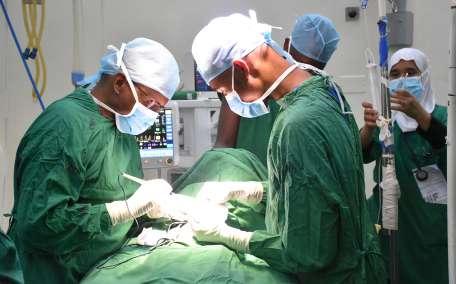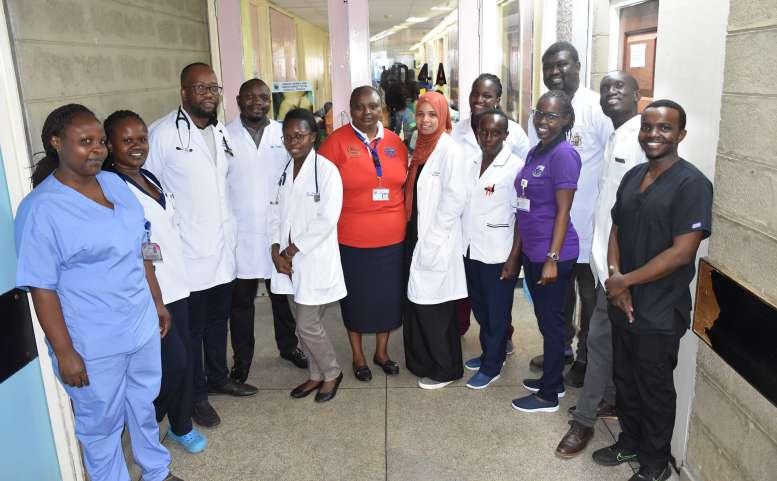
4 minute read
Paediatric Surgery Unit holds annual Hernia and Undescended Testis Surgical Project
By Winfred Gumbo & Sarah C. Wanjiku
Kenyatta National Hospital (KNH) Paediatric Surgery Unit held the Annual Hernia and Undescended Testis Surgical Project between the 2nd and 5th of May, 2023 and saw a number of children benefit from the life changing procedures.
Advertisement

Representatives of Ward 4A staff led by Ms. Rosemary Thaiya (C), Senior Nursing Officer. The Ward hosted all beneficiaries of the Annual Hernia and Undescended Testis Surgical Project
PHOTO | STEVE ARWA
Before the Surgical Project, a multidisciplinary Committee chaired by Dr. Francisca Syovata, Paediatric Surgeon who represented the Head of Unit for Paediatric Surgery was constituted with every representative being allocated a task to ensure smooth flow of events come the actual week of the project.
Screening took place at both the Paediatric Surgical Outpatient Clinic No. 23 and Ward 4A from 24th - 28th April followed by the 4-day project.
Hernia is a condition where a tissue pushes out of its original cavity and bulges out of the wall. There are various types of Hernia which include Epigastric Hernia, Femoral Hernia, Hiatal Hernia, Incisional Hernia, Inguinal Hernia and Umbilical Hernia which all have various causes.
According to Dr. Jeremiah Kamwetu, Paediatric Surgeon at KNH, Hernia can be detected as soon as a child is born or during the neo-natal period. “Normally for the Inguinal Hernia, a parent, a physician or a mid-wife will identify it immediately a child is born. They will notice a protrusion in the groin or umbilicus when a baby is crying or when there is an increase in the abdominal pressure like when attempting to pass stool or urine. It is most common when the babies are crying or in distress,” he said during the interview.
“When the children are in the womb, the testis are usually inside the abdomen. They need to descend, pass through the groin and get to the scrotum by the time the babies are born so you find that there are some children who by the time they are born, the testis can get stuck somewhere along that line,” added Dr. Kamwetu.
He further said that failure to rectify these can lead to long-term consequences. “The longer the testis is out of the scrotum or high, the higher the risk of infertility and testicular cancer.”
To easily identify the conditions, parents need to look out for symptoms that could point to the need for urgent medical intervention, particularly by a Paediatric Surgeon.
“For the boys, it is always advisable for mothers, fathers to just check in their scrotum and see if they can feel both testis. If they cannot feel them, they should get checked and be confirmed for the diagnosis,” said Dr. Caroline Mwende, a Paediatric Surgeon, KNH.
Newsline had an opportunity to speak to a couple of mothers whose children were among the first group to undergo surgery and the delight on their faces was evident.
“Kusema ukweli hii Kenyatta imetusaidia sana,” (Speaking the truth, KNH has been of great help to us), said Ms. Millicent Ragot whose 8-year-old child was recovering at Ward 4A.
Ms. Ragot knew her child had undescended testis one week after birth while dressing him with diapers.
“Nikimfunga diapers, nilikuwa naona upande moja imehang,” (I noticed one side of the testis were hanging), she said.
Every hospital she went to kept pushing the surgery forward since there were a lot of children booked previously before her. She eventually gave up on waiting and was excited when she got to know of the project via the KNH Twitter page.
Ms. Linda Wambui could not hide her joy too. “For the past two months, my child started having a swelling on his private parts and when I got to know of the project, I brought him for screening and he was booked for surgery,” she said.
They are among the majority of parents who are going home with their children safe following the tireless efforts of the multidisciplinary team at Theatre 12 and Ward 4A where they were recovering post-surgery.
At the time of writing this piece, Ms. Rosemary Thaiya, a Senior Nursing Officer at Ward 4A said a total of 70 children had been successfully operated on.
“We expect to reach about 90 children by close of the day and the remaining ones will be scheduled for operations at a later date,” she said. “After discharge, we give them some medication consisting of antibiotics and painkillers then book for them clinic appointments to see how far the recovery process is,” she concluded.
From Newsline, we would like to appreciate the Paediatric Surgery Unit team for their dedication to the project and wish the children a quick recovery.
MAIN PHOTO | STEVE ARWA Dr. Joel Lesan, (L) Head of Unit, Paediatric Surgery leading a multidisciplinary team of specialists to conduct surgery on a patient during the Annual Hernia and Undescended Testis Surgical Project










